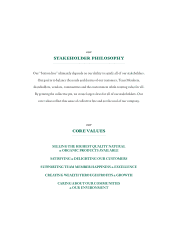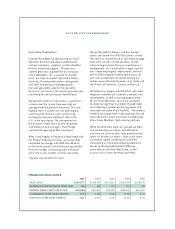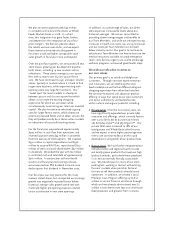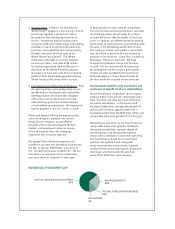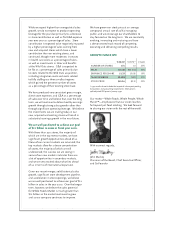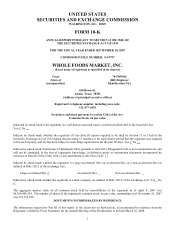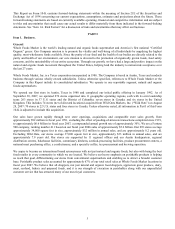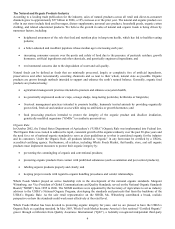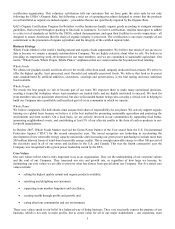Whole Foods 2007 Annual Report Download - page 12
Download and view the complete annual report
Please find page 12 of the 2007 Whole Foods annual report below. You can navigate through the pages in the report by either clicking on the pages listed below, or by using the keyword search tool below to find specific information within the annual report. 6
members, suppliers, investors, and the community and environment. All are linked interdependently. In 2007, Business
Ethics magazine ranked us number 54 on its “100 Best Corporate Citizens List for 2007,” a list honoring companies that
excel at serving a variety of stakeholders well.
Foundations
In 2005, we created two independent, non-profit organizations, the Animal Compassion FoundationTM and Whole Planet
FoundationTM, designed to reach our larger community stakeholders. The two private foundations were initially funded with
seed money totaling over $1 million raised from two global “Five Percent Days,” in which five percent of the amount of all
customer purchases at our stores was donated to the foundations. Both foundations, which are based in Austin, Texas and
have their own boards of directors, are aligned with the mission we set forth more than 25 years ago with respect to
community involvement and responsibility. As we have grown and are doing more business around the world, we believe it
has become increasingly important for us to extend our vision of “community” from our backyards to the global markets in
which we are trading.
The Animal Compassion Foundation was established as a natural progression of our efforts to help producers evolve their
practices for raising farm animals naturally and humanely. Dedicated to improving the lives of farm animals, the Animal
Compassion Foundation seeks to learn and share best practices that support the animals’ needs and behaviors by supporting a
worldwide network of producers and researchers, and leading and funding on-farm research and producer workshops. More
specifically, the Animal Compassion Foundation is focusing on four primary areas:
• providing research money for on-farm and academic studies;
• offering low-cost producer workshops that provide both theoretical background and practical application;
• creating an interactive website that allows online users to access species-specific case studies, animal husbandry
techniques and strategies, and links to other resources; and
• offering consultative services to both individual groups and producer groups.
The Whole Planet Foundation’s mission is to create economic partnerships with the poor in the developing-world
communities that supply our stores with product. Through innovative assistance for entrepreneurship – including direct
micro-credit loans and tangible support for other community partnership projects – the Whole Planet Foundation seeks to
expand the energy and creativity of every person with whom it works in order to create wealth and prosperity in emerging
economies. Micro-credit is a system pioneered by Professor Muhammad Yunus, founder of the Grameen Bank in
Bangladesh and recipient of the 2006 Nobel Peace Prize. The philosophy behind micro-credit is to provide the poor access to
credit without requiring contracts or collateral, enabling them to rise out of poverty through their own efforts. The Whole
Planet Foundation believes micro-credit is one of the best methods to help individuals lift themselves out of poverty through
their own ingenuity. The Whole Planet Foundation is partnered with Grameen Trust in Costa Rica, Guatemala, India and
soon Indonesia to support micro-lending programs in communities where the Company sources products. The Whole Planet
Foundation is also supporting micro-lending programs with other outstanding micro-finance institutions such as Adelante
Foundation and Pro Mujer Nicaragua with hopes to expand their portfolio to include other partners over time.
As of September 30, 2007, the Whole Planet Foundation had committed over $5.2 million in grants to five micro-lending
projects. These projects are in Costa Rica, where Whole Foods Market sources bananas and pineapples; Guatemala and
Nicaragua, where Whole Foods Market has relationships with coffee farmers; Honduras, where the Company sources
bananas and buys coffee; and India, where the Company buys tea. To date, the Whole Planet Foundation’s implementing
partners have supported over 14,000 micro-entrepreneurs and their families. It is estimated that each woman with whom the
foundation works in the developing world supports a family of five, which means our support is indirectly contributing to the
prosperity of 70,000 individuals. Micro-entrepreneurs supported by the Whole Planet Foundation’s implementing partners
are utilizing the loans for home-based businesses such as poultry and pig farming, agriculture, furniture making, tailoring,
and selling handicrafts, homemade and bakery-made foods, clothing and footwear. The Whole Planet Foundation hopes to
expand its projects in 2008 to include micro-lending in Indonesia, Kenya and Tanzania, where Whole Foods Market sources
coffee through its Allegro Coffee Company.
Products
We offer a broad and differentiated product selection with a strong emphasis on perishable foods designed to appeal to both
natural and organic foods and gourmet shoppers. Most of our products are from natural and organic food vendors; however,
we do sell certain conventional national brands that meet our quality standards.


